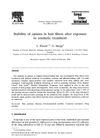TLDR Procyanidin oligomers can protect hair from oxidative damage and could be good for hair care products.
The study investigated the effect of procyanidin oligomers on hair damage caused by oxidative stress. Procyanidins, which are flavonoid oligomers found in plants, were known for their antioxidant, anti-inflammatory, and enzyme inhibitory properties. The research utilized various methods, including electrophoresis, transmission electron microscopy, and fluorescence dye, to evaluate oxidative damage in bleached hair. The findings demonstrated that procyanidin oligomers strongly bound to keratin in hair and inhibited oxidative damage. The results suggested that procyanidin oligomers could be a potential candidate for developing hair care products with protective effects against hair damage.
 66 citations
,
September 2005 in “Photochemical & photobiological sciences”
66 citations
,
September 2005 in “Photochemical & photobiological sciences” We don't fully understand how sunlight damages different types of hair.
27 citations
,
October 2003 in “Dermatologic Clinics” Certain hair care practices in African American girls can lead to scalp and hair issues.
 63 citations
,
August 1996 in “Forensic Science International”
63 citations
,
August 1996 in “Forensic Science International” Cosmetic treatments like bleaching and perming can greatly reduce opiate levels in hair, possibly leading to false-negative drug tests.
 6 citations
,
October 2017
6 citations
,
October 2017 Indian Gooseberry has potential for cancer prevention and treatment and promotes hair growth.
 40 citations
,
August 2018 in “Skin appendage disorders”
40 citations
,
August 2018 in “Skin appendage disorders” Some alternative treatments for hair loss might work, but more research is needed.
 16 citations
,
September 2018 in “Journal of Ethnopharmacology”
16 citations
,
September 2018 in “Journal of Ethnopharmacology” Plant-based remedies may treat hair loss by reducing inflammation and improving insulin resistance.

Nanocarriers with plant extracts show promise for safe and effective hair growth treatment.
1 citations
,
February 2024 in “Diversity” African plants can treat hair issues and may help with diabetes.





